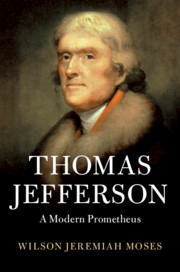Book contents
- Thomas Jefferson
- Cambridge Studies on the American South
- Frontispiece
- Thomas Jefferson
- Copyright page
- Dedication
- Contents
- Preface
- Acknowledgments
- Note on Methods and Bibliography
- 1 Introduction
- 2 Lincoln and Historiography
- 3 Let Our Workshops Remain at Monticello
- 4 Life, Liberty, Property, and Peace
- 5 What is Genius? “Openness, Brilliance, and Leadership”
- 6 A Renaissance Man in the Age of the Enlightenment
- 7 Baconism and Natural Science
- 8 Anthropology and Ethnic Cleansing: White “Rubbish,” Blacks, and Indians
- 9 Education, Religion, and Social Control
- 10 Women and the Count of Monticello
- 11 Debt, Deference, and Consumption
- 12 Defining the Presidency
- Index
8 - Anthropology and Ethnic Cleansing: White “Rubbish,” Blacks, and Indians
Published online by Cambridge University Press: 01 April 2019
- Thomas Jefferson
- Cambridge Studies on the American South
- Frontispiece
- Thomas Jefferson
- Copyright page
- Dedication
- Contents
- Preface
- Acknowledgments
- Note on Methods and Bibliography
- 1 Introduction
- 2 Lincoln and Historiography
- 3 Let Our Workshops Remain at Monticello
- 4 Life, Liberty, Property, and Peace
- 5 What is Genius? “Openness, Brilliance, and Leadership”
- 6 A Renaissance Man in the Age of the Enlightenment
- 7 Baconism and Natural Science
- 8 Anthropology and Ethnic Cleansing: White “Rubbish,” Blacks, and Indians
- 9 Education, Religion, and Social Control
- 10 Women and the Count of Monticello
- 11 Debt, Deference, and Consumption
- 12 Defining the Presidency
- Index
Summary
As certainly and unequivocally as Thomas Aquinas’ Summa Theologica was intended to defend his Church’s dogmas, so was Jefferson’s Notes on Virginia intended to defend the reputation of his country. As soon as it was published, Jefferson began to distribute it to selected Parisian men of high social standing. One of these, the Marquis de Chastellux, received also a cover letter that was clearly a polemic in defense of a polemic. The Notes were compiled as a refutation of the views of the French mathematician Georges-Louis Leclerc, Comte de Buffon, “on the general question of the degeneracy of animals in America.” They were also a response to claims of the Abbé Raynal, “as to the degeneracy of the man of Europe transplanted to America.”1 It was fundamentally and deliberately patriotic in its goals.
- Type
- Chapter
- Information
- Thomas JeffersonA Modern Prometheus, pp. 270 - 311Publisher: Cambridge University PressPrint publication year: 2019

